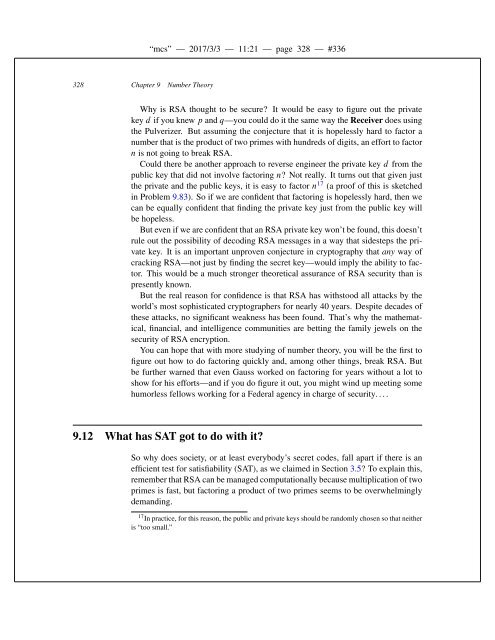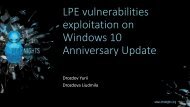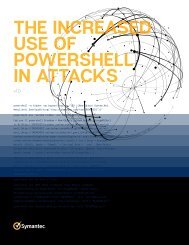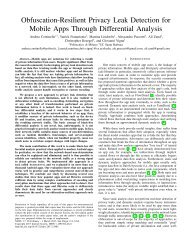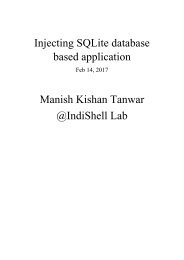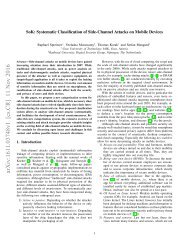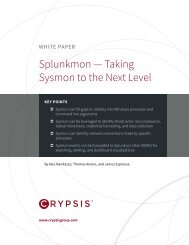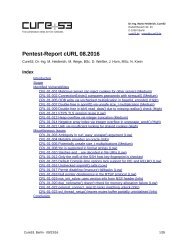Mathematics for Computer Science
e9ck2Ar
e9ck2Ar
You also want an ePaper? Increase the reach of your titles
YUMPU automatically turns print PDFs into web optimized ePapers that Google loves.
“mcs” — 2017/3/3 — 11:21 — page 328 — #336<br />
328<br />
Chapter 9<br />
Number Theory<br />
Why is RSA thought to be secure? It would be easy to figure out the private<br />
key d if you knew p and q—you could do it the same way the Receiver does using<br />
the Pulverizer. But assuming the conjecture that it is hopelessly hard to factor a<br />
number that is the product of two primes with hundreds of digits, an ef<strong>for</strong>t to factor<br />
n is not going to break RSA.<br />
Could there be another approach to reverse engineer the private key d from the<br />
public key that did not involve factoring n? Not really. It turns out that given just<br />
the private and the public keys, it is easy to factor n 17 (a proof of this is sketched<br />
in Problem 9.83). So if we are confident that factoring is hopelessly hard, then we<br />
can be equally confident that finding the private key just from the public key will<br />
be hopeless.<br />
But even if we are confident that an RSA private key won’t be found, this doesn’t<br />
rule out the possibility of decoding RSA messages in a way that sidesteps the private<br />
key. It is an important unproven conjecture in cryptography that any way of<br />
cracking RSA—not just by finding the secret key—would imply the ability to factor.<br />
This would be a much stronger theoretical assurance of RSA security than is<br />
presently known.<br />
But the real reason <strong>for</strong> confidence is that RSA has withstood all attacks by the<br />
world’s most sophisticated cryptographers <strong>for</strong> nearly 40 years. Despite decades of<br />
these attacks, no significant weakness has been found. That’s why the mathematical,<br />
financial, and intelligence communities are betting the family jewels on the<br />
security of RSA encryption.<br />
You can hope that with more studying of number theory, you will be the first to<br />
figure out how to do factoring quickly and, among other things, break RSA. But<br />
be further warned that even Gauss worked on factoring <strong>for</strong> years without a lot to<br />
show <strong>for</strong> his ef<strong>for</strong>ts—and if you do figure it out, you might wind up meeting some<br />
humorless fellows working <strong>for</strong> a Federal agency in charge of security. . . .<br />
9.12 What has SAT got to do with it?<br />
So why does society, or at least everybody’s secret codes, fall apart if there is an<br />
efficient test <strong>for</strong> satisfiability (SAT), as we claimed in Section 3.5? To explain this,<br />
remember that RSA can be managed computationally because multiplication of two<br />
primes is fast, but factoring a product of two primes seems to be overwhelmingly<br />
demanding.<br />
17 In practice, <strong>for</strong> this reason, the public and private keys should be randomly chosen so that neither<br />
is “too small.”


